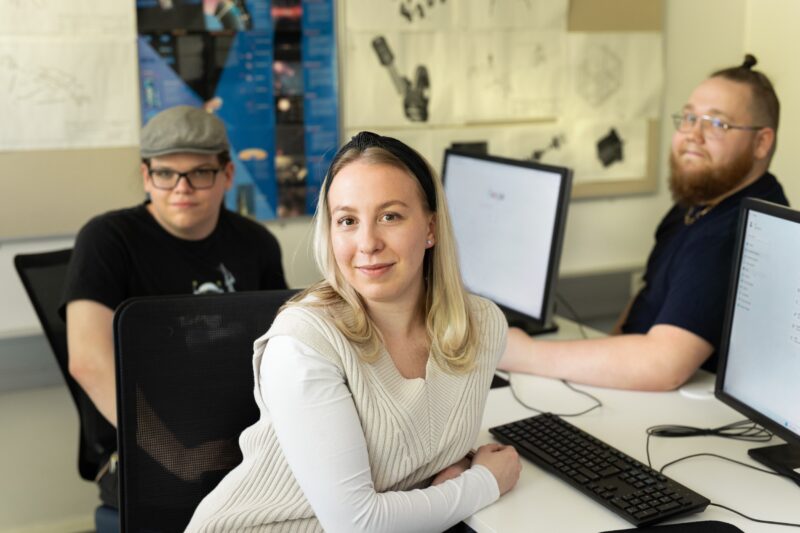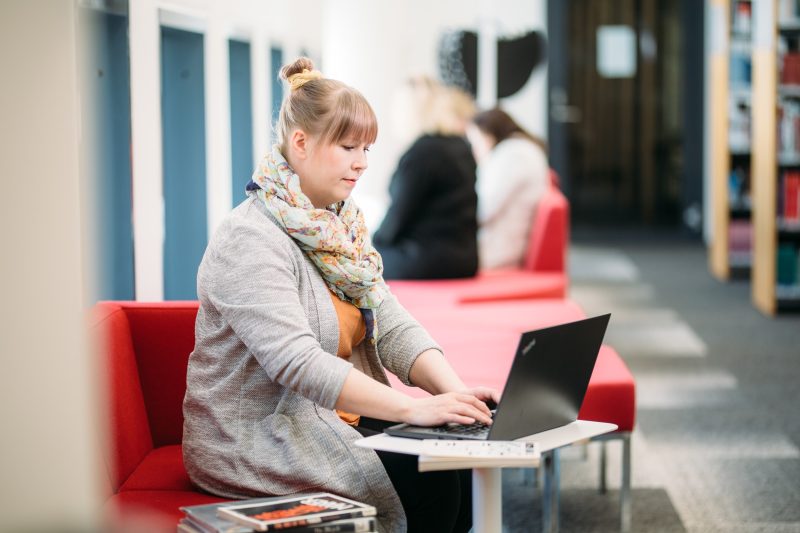
Financial support for your international work experience
It is possible to get a grant also for your traineeship abroad as long as the traineeship will be a part of the work placement in your degree. International work experience is appreciated by many employers in today’s global world.
Read below how to complete a traineeship abroad and how to receive financial support via Erasmus+ or HAMK!

Plan your traineeship abroad
You can complete your work placement partly or fully abroad, the duration should be 2-12 months. Please discuss with your guidance counsellor or work placement coordinator about the best timing of your traineeship.
To receive the grant, your traineeship needs to be full time and fully included as a part of your degree. Work placement abroad provides 6 credits per month worked.
At this point it might also be useful to ask your guidance counsellor or work placement coordinator what sort of traineeships are suitable for your degree and how can you make sure you will learn useful skills. They might also have ideas where to find interesting traineeships.
Once you know that your degree has space for a traineeship and you know when you would like to go, you can contact HAMK International for advice regarding traineeships abroad. The best way to reach us is by emailing us at outgoing@hamk.fi
Our team will help you with the application process and finding information about the practical steps of living abroad.
Please note that we process applications throughout the year, but you should contact us at minimum one month before the start of your work placement. If you are planning work placement abroad during summer, please contact us by the end of May.
Finding and applying for traineeships abroad is the responsibility of the student, but you can always ask for advice from other students, your degree programme and HAMK International.
You can find placements available, for example, on the pages below. In some fields more generic job posting websites like LinkedIn might also be useful.
EDUFI traineeship for higher education students and recent graduates
Work and Travel (in Finnish)
- Full time traineeship for 2-12 months
- 6 credits per month of work will be included in your degree
- From January 2025, you are not eligible for a grant if you complete the work placement in your home country
- You can only participate in one exchange at a time: it is not possible to receive traineeship grant and student grant at the same time
- No other support received for the same traineeship from HAMK or Finnish National Board of Education
- You are not eligible for the grant if you work in an EU organization or an organization managing EU programmes
- For nursing education, the placements are generally organized through the university. In this case, the application timetable for student exchanges is followed.
Grants and funding
The amount of grant for traineeships depends on the country you are working in. Whether or not your traineeship is paid or unpaid, the grant amount remains the same. Please also read below about travel grant, fewer opportunities and inclusion support.
For the following countries (Category 1) the grant is €690 per full month worked: Denmark, Iceland, Ireland, Liechtenstein, Luxembourg, Norway, Sweden, Austria, Belgium, France, Germany, Italy, Netherlands, Switzerland* and the United Kingdom*.
For the following countries (Category 2) the grant is €640 per full month worked: Bulgaria, Croatia, Cyprus, Czech Republic, Estonia, Greece, Hungary, Latvia, Lithuania, Macedonia, Malta, Poland, Portugal, Romania, Slovakia, Slovenia, Spain, Turkey.
For countries not listed above the grant is €700 per full month worked: for example Australia, Brazil, South Korea, Canada, Kosovo, Mexico, USA.
Starting from academic year 2024-2025, students participating in traineeships abroad are eligible for travel support. The amount of travel support is based on the distance to the traineeship location from HAMK campus and whether or not you choose to travel Green. The distance is calculated with Erasmus+ distance calculator.
Based on your method of travel, you will also receive grant for the travel days: two days for standard travel, up to six days for Green travel. The grant amount of the travel day is the same as your daily grant during your traineeship.
What is Green Travel?
A student is eligible for green travel support if the whole trip, most of the trip, or at least the second leg of the outward-return journey, is made using less polluting modes of travel: train, carpooling or bus. If you are interested, please ask for more details from HAMK International.
Ideas for greener travel
- Erasmus by Train
- Maata pitkin matkustaminen (Handy tool for finding land connections to Europe, unfortunately only in Finnish)
- 7 best tips fo Erasmus+ green travel
Travel support amounts
| Travel Distance | Green Travel | Standard travel |
| 10 – 99 km | €56 | €28 |
| 100 – 499 km | €285 | €211 |
| 500 – 1999 km | €417 | €309 |
| 2000 – 2999 km | €535 | €395 |
| 3000 – 3999 km | €785 | €580 |
| 4000 – 7999 km | €1188 | €1188 |
| 8000 km or more | €1735 | €1735 |
Fewer opportunities top-up
The Erasmus+ programme pays a ‘fewer opportunities top-up’ to Erasmus students who have fewer opportunities to participate in the Erasmus programme. From the academic year 2022-23, this category will include: family members (with minor children to care for even if they stay in their home country), carers (with a carer’s agreement with the municipality), disabled and disabled persons (at least moderate functional impairment), students with serious or chronic health problems, or students granted international protection.
The additional allowance for work placements (2-12 months) is €250 per month.
Eligibility for the top-up support us proven with the declaration on honour signed by the student and HAMK. It is then uploaded to the SoleGRANT grant application.
Special needs and inclusion support
In addition to the fixed fewer opportunities supplement mentioned above, students can also apply for and receive an inclusion grant based on actual costs if they have more or different costs than the fixed grant covers, or if they also have other obstacles to the mobility period than the one on the basis of which the fixed supplement was granted.
More information on the website of the Finnish National Board of Education.
You can still be eligible for financial aid when completing your traineeship abroad: Payment of financial aid abroad | Our Services | Kela
Please do note that if your traineeship is paid, it might have an impact on the amount of financial aid: Student’s own income | Our Services | Kela
In addition, you should check about external funding. Different organisations, foundations, cities, friendship associations etc. may have funding available for studies abroad. Also check the websites of Council of Finnish Foundations (in Finnish) and Fulbright Center.
EDUFI traineeship for higher education students and recent graduates
You can apply for a traineeship abroad through EDUFI and be paid a scholarship by EDUFI.
By receiving the grant you commit to:
- follow the Learning Agreement for Traineeship.
- get the necessary permits, insurance and vaccinations in order
- return the necessary forms and reports on the exchange as instructed and on time
- repay all or part of the grant if you interrupt or cancel your exchange, do not return the required documents to SoleMOVE on time or do not accumulate enough credits during your exchange (6 credits/month for internships)
- The actual duration of the exchange will be checked after the exchange on the Traineeship Certificate issued by the host organisation. If the exchange is shorter than planned, the grant will be recalculated and, if necessary, the student will return part or all of the grant received.
- An extension of the exchange period also requires an amendment to the grant agreement.


Applying for the grant
Learning Agreement (LA) is a document specifying what sort of work you will be doing and what you will learn during your traineeship. It is also your work contract, signed by you, your employer and guidance counsellor or work placement coordinator of your study program.
Please start filling the LA as soon as you have confirmed your work placement. It is mandatory to attach the signed document to your SoleMove application. Before gathering the signatures, it is a good idea to check with HAMK International that all the fields are filled in as they should.
The template is available here: Learning agreement for traineeships
If you have any questions that are not answered in the instructions, please contact HAMK International.
Once you have your Learning Agreement filled out and signed by all three parties, you can create an application in SoleMove.
General instructions to using SoleMove can be found here: SoleMove instructions
Instuctions on how to fill in the application for a work placement can be found here:
After submitting your application, it will be reviewed and approved by HAMK International and your guidance counsellor. After these approvals, you will have to confirm your traineeship once more in SoleMove.
After the approvals and your confirmation in SoleMove, you will receive an email with instructions on how to complete the SoleGrant application. SoleMove is needed to keep record of your studies, SoleGrant is needed for you to receive your grant.
Please find the instructions for SoleGrant below: SoleGrant instructions
You will receive an email once your grant application has been approved. The payment date is usually a week after the grant application is approved.
You can apply for a traineeship grant throughout the year, whenever you know you will start your traineeship abroad.
You should apply for the grant well in advance before the start of your traineeship. We will not process applications that arrive after the end of the traineeship. We aim to pay the grant at least two weeks before the start of the exchange, given that all the required documents are in SoleMove and SoleGrant.
Grants for long-term exchanges are paid in two instalments. The first part of the grant (80%) will be paid once the required documents have been duly entered into SoleMove and SoleGrant.
The remaining 20% will be paid once the student has entered the after exchange documents into SoleMove within one month of the end of the exchange. If the student was on exchange in an Erasmus+ country, the student must complete the Erasmus+ Participant Report questionnaire.
Completing a traineeship abroad
- If there are any changes to your original training plans, please inform HAMK International without delay.
- Always contact HAMK International in case of any problems. Also, remember to notify HAMK International immediately if your traineeship is extended, shortened or interrupted, as this may affect your grant.
- Remember to ask your employer to complete the Traineeship Certificate when your traineeship period is coming to an end.
- Fill in the After Exchange tab of SoleMOVE. Within two months of the end of your traineeship, upload your Traineeship Certificate to SoleMOVE. Please note that the exact dates of the exchange must be specified in the Traineeship Certificate document. The amount of the grant will be revised after the exchange on the basis of these dates.
- Fill in the SoleMOVE Feedback tab. Please answer the questions carefully, it will be especially useful for new exchangers!
- Check with your work placement coordinator to see if you need to submit a separate work placement report to get credit for your work placement. Please also submit a copy of your Traineeship Certificate to your work placement coordinator!
- If you were on an Erasmus+ exchange, answer the EU Survey that will be sent to your email through the Beneficiary Module. This has done be completed in addition to your feedback in SoleMOVE. A complementary EU survey will be sent to students whose recognition process was not completed at the time of the original EU survey. This second survey is voluntary and does not have an effect on the final instalment of your grant.
NB: Students have 2 months’ time to take care of all the after exchange items, otherwise you will not receive the final instalment of the grant (or may have to repay the grant in full). If you are not able to meet this deadline, please contact HAMK International immediately.
If you have to interrupt your training or your training time is shorter than originally planned, do the following:
- report the interruption to your own training coordinator
- be prepared to pay back any excess grant paid to you
- also notify KELA
- remember to take care of the post-exchange documentation in SoleMOVE

Practicalities before you go
Once the exchange location is confirmed, you can then make the practical arrangements, such as booking airline tickets, obtaining a visa/residency permit, finding accommodation, etc.
It is also worth finding out whether the host university or organisation can help you with finding accommodation and other practical matters.
About HAMK’s accident insurance
HAMK’s accident insurance is valid for student exchanges and unpaid internships and only covers the daily internship/study period and the journey between the internship/school and the local residence. The HAMK accident insurance does not cover accidents during free time, travel sickness, luggage or damage to persons or property caused to others. It is therefore the responsibility of each exchange student to ensure that he/she has adequate insurance cover, in accordance with the following guidelines. You must not go on an exchange without adequate insurance cover.
Read more about HAMK’s insurance in intranet (login required):
ALL THOSE GOING ON A STUDENT OR TRAINEE EXCHANGE MUST PROVIDE FOR THEMSELVES:
- Travel insurance
You must have your own travel insurance for the duration of your exchange, check with your insurance company. Travel insurance does not usually cover normal medical expenses, so you will need separate sickness and accident insurance or a European Health Insurance Card. - a European Health Insurance Card (EHIC) if you are going to an EU/EEA country or Switzerland.
For more information, see European Health Insurance Card
Each country provides care according to its own system. You will have to pay the same patient fees and co-payments as permanent residents. If you go to a hospital or doctor who is not covered by the scheme in that country, you will have to pay the costs yourself.
OR
health insurance/sickness and accident insurance if you go outside the EU/EEA countries.
Sometimes the host country or institution will recommend a particular type of insurance, but usually it is sufficient to have a comprehensive policy.
A few non-EEA countries have signed a social security agreement with Finland, for more information, please visit the Kela website: Social security agreements
If the host institution or employer asks for a HAMK certificate of insurance (an English-language explanation of what the HAMK’s insurance covers for its students), you can get it from the HAMK office ( international@hamk.fi )
IN ADDITION, ALL THOSE GOING ON A PLACEMENT WITH A PAID WORK PLACEMENT MUST FIND OUT:
- Does the employer’s insurance include liability insurance?
If your employer does not include you in their liability insurance, the work placement will most likely not be possible, as it is almost impossible for an individual to obtain liability insurance for the duration of their work. - Insurance during working hours
In paid work placements, you are usually insured by your employer for the time you work, but different countries have different practices, so check this carefully. Note! HAMK’s accident insurance is not valid for paid work placements. Therefore, if your employer does not insure you during your working hours, you will have to take out accident and sickness insurance yourself, both during working hours and during your free time.
Insurance abroad – who is responsible?
| Unpaid Work placement | Paid Work placement | |
| Accident insurance (covers training time and travel between work and home) | HAMK | Employer |
| Liability insurance | HAMK (not including USA and Canada) | Employer |
| Travel insurance, free time | Student | Student |
| Health insurance (European Health Insurance Card or non-EU health insurance/sickness and accident insurance) | Student | Student |
Insurance glossary
Travel insurance = Travel insurance protects and compensates you if something happens during your trip. Check the conditions with your insurance company.
Liability insurance = Liability insurance is insurance that covers damage you cause to third parties for which you are legally responsible.
Before you go abroad, it’s good to remember:
- Check the vaccinations required by the destination country and get them well in advance. In some countries, vaccinations are compulsory for visas, but it is always a good idea to get the recommended vaccinations.
- Check out the EU health care website EUtervey.fi for information on getting sick when travelling abroad.
- Visit your doctor, especially if you take regular medication.
Also check out:
1. Health guide for travellers (only in Finnish)
To Europe
If you are an EU national going to another EU country:
You do not need to obtain a residence permit or visa in advance from Finland when you go on an exchange. If your stay abroad lasts longer than 3 months, in some countries you will need to register your residence permit. This is usually done with the local police or other authority.
Check with your host university or traineeship centre to see which documents are required in your host country. You will usually need a valid passport, proof of place of study, a guarantee of sufficient funds (e.g. study grant decision, scholarship decision), proof of health insurance (Kela E-form) and passport photos.
If you are a non-EU or EEA national going to an EU country:
If you are not an EU or EEA national, check the residence permit requirements. As a general rule, third-country nationals should always apply for a separate residence permit for the exchange period at the nearest consulate of the country of destination.
Outside Europe
If you are travelling outside the EU:
Check visa regulations. For more information on visas and residence permits, contact the Finnish embassy in the country of destination.
Visa and/or residence permit can be obtained from the Finnish embassy in the country of destination before your departure and can take from a few weeks to a few months.
Research the typical safety risks of your destination. For example Finnish Ministry of Foreign Affairs updates the safety status of all countries on their website (unfortunately only in Finnish) Matkustustiedotteet – Ulkoministeriö (um.fi)
If you are going to a high-risk area, you should make a travel notification at www.matkustusilmoitus.fi .
By making a declaration, the Ministry of Foreign Affairs can contact you if necessary, for example in the event of a crisis situation.
Green travel
Have you considered traveling by land instead of flying? You are entitled to more paid travel days and a higher travel grant if you choose to travel green.
More information from HAMK International as well as for example from | Green Erasmus
Sustainability in destination
What are the things that you need to take with you? Is there something you could by second hand while in destination? What is your impact on local economy, culture and nature? There are many choices you can make, but often they can be difficult to acknowledge. Have a look at online resources, for example Travel Better (sustainabletravel.org) to gain some insights for better travel.
Documents and instructions
Documents
Learning Agreement for traineeships
Erasmus+ Student Charter
Fewer opportunities top up – declaration of honor
Traineeship Certificate (available also on the page 3 of your Learning Agreement)
Green Travel Declaration
Instructions
SoleMove application
SoleMove – After exchange